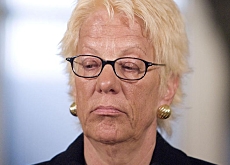Del Ponte says Belgrade deceived her

United Nations war crimes prosecutor Carla Del Ponte has said Serbia misled her over the "imminent arrest" of former Bosnian Serb general Ratko Mladic.
The Swiss prosecutor’s comments followed the decision by the European Union to break off talks on closer ties with Belgrade because Mladic remained a fugitive.
Del Ponte, who was told two months ago that Mladic’s arrest was close, said on Wednesday that the former army commander was in the Belgrade region and changing apartments daily.
The Swiss told a news conference in The Hague in the Netherlands that Serbian authorities knew Mladic’s location as recently as ten days ago and could have arrested him.
She added that she suspected Mladic – indicted by her tribunal in 1995 on genocide charges – was eluding arrest thanks to inside information about the authorities’ efforts to track him.
Del Ponte said she was not convinced Belgrade had a “focused and coordinated plan” for Mladic’s arrest, calling Serbia’s handling of the case “unprofessional”.
The prosecutor welcomed the EU’s decision to freeze talks with Serbia after she delivered a negative report on Belgrade’s efforts to EU Enlargement Commissioner Olli Rehn.
Simply wrong
She said the failure to deliver Mladic to The Hague for trial meant that she was “misled when I was told at the end of March that the arrest of Mladic was a matter of days or weeks”, and any expectation that Mladic could be induced to surrender was “completely unrealistic and simply wrong”.
Del Ponte said she had been “particularly disappointed” that nothing had happened.
Law professor Marco Sossali at Geneva University told swissinfo that the Serbian government had difficulty reconciling what it said at home and what it said abroad.
“I don’t know what they promised her but normally the difficulty facing the government of Serbia and Montenegro is that on the one hand they have to tell the western states ‘we do everything’.”
“On the other hand, on the domestic level it is difficult for their survival to actually do everything.”
Asked whether Mladic would give himself up voluntarily, Sassoli commented that this would be a “good solution”.
But he added: “It probably wouldn’t be so voluntary because his remaining friends would tell him that they could no longer help him.”
Last gesture
“Therefore he would somehow be obliged and he could make a last gesture of heroism by saying ‘I have fought for my country and now I’m ready to go to The Hague for my country.'”
After the EU’s decision to freeze talks, the Serbian deputy prime minister, Miroljub Labus, announced his resignation.
But the Serbian prime minister Vojislav Kostunica, said his government had done all it could to bring in Mladic.
“In view of the fact that his entire network of helpers has been uncovered, Ratko Mladic is now hiding completely alone. The question now is… to discover where he is hiding,” Kostunica said in a statement.
swissinfo, Robert Brookes with agencies
The International Criminal Tribunal for the Former Yugoslavia was established by Resolution 827 of the United Nations Security Council in May 1993.
Based in The Hague, it is the first international body for the prosecution of war crimes since the Nuremberg and Tokyo trials held after the Second World War.
The tribunal has jurisdiction over individuals responsible for genocide, war crimes and crimes against humanity in the territory of former Yugoslavia after January 1, 1991.
Switzerland’s Carla Del Ponte is the tribunal’s chief prosecutor.
Ratko Mladic, aged 64, commanded the Bosnian Serb forces during the 1991-95 Bosnian war in which an estimated 200,000 people were killed.
He has been charged with genocide for the deaths of more than 8,000 Bosnian Muslims in the UN-declared safe zone of Srebrenica in July 1995.
Mladic is wanted in connection with war crimes alongside Radovan Karadzic, the former Bosnian Serb leader who is also on the run.
In March, Del Ponte said she felt personal defeat after the death in his prison cell of the former Yugoslav president, Slobodan Milosevic.
She added that the death made the arrest of Karadzic and Mladic even more pressing

In compliance with the JTI standards
More: SWI swissinfo.ch certified by the Journalism Trust Initiative











You can find an overview of ongoing debates with our journalists here . Please join us!
If you want to start a conversation about a topic raised in this article or want to report factual errors, email us at english@swissinfo.ch.